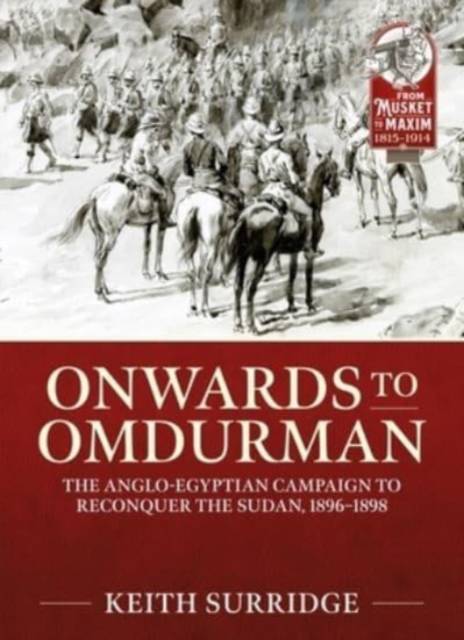
Je cadeautjes zeker op tijd in huis hebben voor de feestdagen? Kom langs in onze winkels en vind het perfecte geschenk!
- Afhalen na 1 uur in een winkel met voorraad
- Gratis thuislevering in België vanaf € 30
- Ruim aanbod met 7 miljoen producten
Je cadeautjes zeker op tijd in huis hebben voor de feestdagen? Kom langs in onze winkels en vind het perfecte geschenk!
- Afhalen na 1 uur in een winkel met voorraad
- Gratis thuislevering in België vanaf € 30
- Ruim aanbod met 7 miljoen producten
Zoeken
€ 34,95
+ 69 punten
Omschrijving
On 2 September 1898, the Anglo-Egyptian army under General Kitchener crushed the Mahdist Sudanese army of the Khalifa Abdallahi at the battle of Omdurman. Depictions of the battle, in books and films, have too often depicted it as the hapless slaughter of the Mahdists by a modern, well-equipped professional army. This book seeks to show, however, that the battle was not a foregone conclusion and that the result might have been closer if the Mahdists had conformed to their battle-plan. By examining the battle in fair detail, the book emphasizes that the Mahdists battle plan was poorly executed, hence their defeat. Although it took another year before the Khalifa was defeated and killed, the battle at Omdurman ended a two-year campaign that had utilized the power of modern Victorian technology.
To fully understand how and why an Anglo-Egyptian army arrived to fight at Omdurman, the book takes a fresh look at the Sudan campaign as a whole, because it provides an excellent example of how modern technology was used to overcome the vagaries of the desert and the river Nile. Thus, railway lines were built to bring troops and supplies across the desert. Communications were enhanced by miles of telegraph wire. Control of the Nile was ensured by British-built gunboats, armed with machine guns and artillery. While the Anglo-Egyptian army carried modern rifles, machine guns and artillery. Kitchener had witnessed Britain's failed Sudan campaign in 1884-85 to rescue General Gordon trapped in Khartoum by Mahdist forces, because of too much haste and not enough forethought. Kitchener did not make the same mistakes. Moreover, he and his officers never underestimated the fighting prowess of their enemy.
Before Kitchener's campaign is examined, however, the book provides context by discussing how and why Britain was involved in Egypt and why the decision was made to invade Mahdist Sudan. It then considers the political, social and military organization of the Khalifa's domain. The book also examines the Egyptian army and provides details later on the British contingent. The various stages of Kitchener's advance are then discussed.
The book is based on British accounts from unpublished material in archives and published contemporary works, for they are readily available. Where possible, the book takes into account the Mahdist perspective by using the available published sources and the Intelligence reports prepared from information supplied by Sudanese agents and informers.
To fully understand how and why an Anglo-Egyptian army arrived to fight at Omdurman, the book takes a fresh look at the Sudan campaign as a whole, because it provides an excellent example of how modern technology was used to overcome the vagaries of the desert and the river Nile. Thus, railway lines were built to bring troops and supplies across the desert. Communications were enhanced by miles of telegraph wire. Control of the Nile was ensured by British-built gunboats, armed with machine guns and artillery. While the Anglo-Egyptian army carried modern rifles, machine guns and artillery. Kitchener had witnessed Britain's failed Sudan campaign in 1884-85 to rescue General Gordon trapped in Khartoum by Mahdist forces, because of too much haste and not enough forethought. Kitchener did not make the same mistakes. Moreover, he and his officers never underestimated the fighting prowess of their enemy.
Before Kitchener's campaign is examined, however, the book provides context by discussing how and why Britain was involved in Egypt and why the decision was made to invade Mahdist Sudan. It then considers the political, social and military organization of the Khalifa's domain. The book also examines the Egyptian army and provides details later on the British contingent. The various stages of Kitchener's advance are then discussed.
The book is based on British accounts from unpublished material in archives and published contemporary works, for they are readily available. Where possible, the book takes into account the Mahdist perspective by using the available published sources and the Intelligence reports prepared from information supplied by Sudanese agents and informers.
Specificaties
Betrokkenen
- Auteur(s):
- Uitgeverij:
Inhoud
- Aantal bladzijden:
- 170
- Taal:
- Engels
- Reeks:
Eigenschappen
- Productcode (EAN):
- 9781915070517
- Verschijningsdatum:
- 6/12/2022
- Uitvoering:
- Paperback
- Formaat:
- Trade paperback (VS)
- Afmetingen:
- 178 mm x 246 mm
- Gewicht:
- 498 g

Alleen bij Standaard Boekhandel
+ 69 punten op je klantenkaart van Standaard Boekhandel
Beoordelingen
We publiceren alleen reviews die voldoen aan de voorwaarden voor reviews. Bekijk onze voorwaarden voor reviews.









